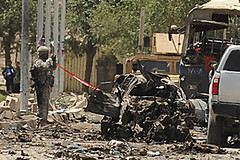
Bombing in Kabul, Afghanistan on May 18, 2010 which resulted in the deaths of NATO soldiers. The U.S. and its allies have occupied this central Asian nation since 2001. The Obama administration has ordered in another 30,000 troops.
Originally uploaded by Pan-African News Wire File Photos
By THOM SHANKER
New York Times
KABUL, Afghanistan — With the American-led military mission temporarily a ship without a captain, the nation’s top admiral spent Saturday in this land-locked war zone reassuring Afghan leaders and allied troops that Washington would not pause in pressing forward its strategy — one that will require enhanced cooperation between civilian and military officials.
“The leadership has changed, but the policy hasn’t changed,” said Adm. Mike Mullen, chairman of the Joint Chiefs of Staff. “The strategy hasn’t changed. And we are very much committed to it.”
Admiral Mullen arrived in Kabul, the Afghan capital, at a tumultuous moment: the top commander in Afghanistan, Gen. Stanley A. McChrystal, was fired by President Obama last week after publication of comments in Rolling Stone by the general and his staff that disparaged senior civilian officials; and the war effort is hindered by rising violence and a frustratingly slow pace of political and economic progress required to attract appeal to a war-weary population.
Admiral Mullen’s agenda included private talks with the most senior level of the Afghan leadership, including President Hamid Karzai and Defense Minister Abdul Rahim Wardak.
But as Mr. Obama himself acknowledged in a textured statement delivered when he relieved General McChrystal of command, the entire national security team — civilian and military — must now come together and work in greater accord.
“That is a mandate for the leadership,” Admiral Mullen told gatherings of military officers and American embassy personnel. “If we don’t make this happen, we are going to fail.”
And he bluntly warned, “We do not have the luxury of time.”
To aggressively press that agenda of enhanced civilian-military cooperation, Admiral Mullen met with the United States ambassador in Kabul, Karl W. Eikenberry, a retired three-star general who had well-publicized disputes with General McChrystal, as well as with Mark Sedwill, the British diplomat who serves as NATO’s senior civilian representative here.
Mr. Sedwill offered an assessment of optimism for the effort now under way, but tempered it with an acknowledgment of past missteps in the fight against the insurgency.
“I don’t think we’ve regained the initiative yet, but we’ve arrested their initiative,” he said. “In the south, we are taking the fight to them. But that takes time to see.”
Admiral Mullen also had an encounter with another senior member of the administration’s national security team — the sort of meeting possible only in the rarefied atmosphere of high-level government travel — when he crossed paths in Brussels with Richard C. Holbrooke, the special representative for Afghanistan and Pakistan, who had been a target of negative comments from the McChrystal team.
That meeting occurred when Admiral Mullen’s Air Force jet stopped to refuel en route to Kabul. Mr. Holbrooke came bounding up the stairs, as his plane, too, was refueling in Brussels on its way home from Pakistan.
The two huddled at length in private.
In Kabul, Admiral Mullen delivered a special message of encouragement to military officers who had served under General McChrystal.
“They are going to be a down group,” Admiral Mullen said in an interview. “Any time you lose a commander, particularly one you care so much about, it crushes you.”
But he told senior military officers that General McChrystal would want them focusing on the mission, not on his abrupt departure from command. And he told the officers to carry away with them the correct example from the controversy leading to General McChrystal’s firing.
He repeated two themes: the military must remain steadfast in its respect for civilian control of the armed forces, and the military must continue to engage with news organizations.
“We need to tell our story,” Admiral Mullen said. “We must not shy from engagement. We must not overcompensate.”
Admiral Mullen told military officers that he had paid a private, personal visit to the Washington home of General McChrystal and his wife after the announcement of the general’s firing.
Mr. Obama nominated Gen. David H. Petraeus, the former Iraq commander who is now in charge of American troops in the Middle East, to take over the mission in Afghanistan. He is scheduled to appear before the Senate Armed Services Committee on Tuesday for a confirmation hearing set at an accelerated pace.
Admiral Mullen emphasized that General Petraeus, who was deeply involved in developing the current counterinsurgency strategy for Afghanistan, would be able to take over command in a seamless transition.
No comments:
Post a Comment